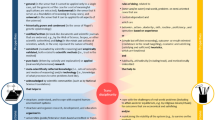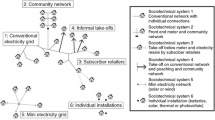Abstract
Transdisciplinarity (TD) has become a buzzword, promoted as a suitable approach to address today’s urgent challenges in human-environment interactions. Looking at its practical implementation, however, challenges still remain to be met. Despite the concept’s popularity, it seems difficult to reconcile the idea of knowledge co-production with research realities. Taking a TD research project dealing with sustainable land management in Southern Africa (Angola, Botswana, and Namibia) as a case study, we aim to provide empirically based insights into the real-world application of this collaborative research approach to improve the general understanding of TD research in the making. Based on semi-structured interviews with project partners and stakeholders, we reveal the underlying interests, mismatching institutions and structures of power shaping the TD research process in this North–South collaboration. We identified TD as falling victim to a kind of “tragedy of the commons”, paralysed between existing power structures and conflicting interests, and being considered as extra work instead of an integral task with an inherent value in itself. By demonstrating some of the underlying causes of the challenging practice of TD, we reveal starting points for changes and provide recommendations that aim to set the base for a more reflexive and fruitful TD knowledge co-production.



Similar content being viewed by others
References
Bergmann M, Jahn T, Knobloch T et al (2012) Methods for transdisciplinary research: a primer for practice. Campus, Frankfurt/New York
Binder CR, Absenger-Helmli I, Schilling T (2015) The reality of transdisciplinarity: a framework-based self-reflection from science and practice leaders. Sustain Sci 10:545–562. doi:10.1007/s11625-015-0328-2
BMBF (2008) Guidelines and general conditions for the funding measure “Sustainable land management”, 24th of October 2008, Bonn
BMBF (2014) International Cooperation. Action Plan of the Federal Ministry of Education and Research (BMBF), Berlin
Bourdieu P (1988) Homo Academicus. Stanford University Press, Stanford
Brannick T, Coghlan D (2007) In Defense of Being “Native”: The Case for Insider Academic Research. Organ Res. Methods 10:59–74. doi:10.1177/1094428106289253
Callard F, Fitzgerald D (2015) Rethinking Interdisciplinarity across the Social Sciences and Neurosciences. Palgrave Macmillan, Basingstoke
Cooke B, Kothari U (2001) Participation. The New Tyranny? Zed Books, London/New York
Nature Editorial (2016a) Early-career researchers need fewer burdens and more support. Nature 538:427
Nature Editorial (2016b) Future present. Nature 531:7–8. doi:10.1038/531007b
Felt U (ed) (2009) Knowing and living in academic research. Institute of Sociology of the Academy of Sciences of the Czech Republic, Prague
Felt U, Igelsböck J, Schikowitz A, Völker T (2013) Growing into what? The (un-)disciplined socialisation of early stage researchers in transdisciplinary research. High Educ 65:511–524. doi:10.1007/s10734-012-9560-1
Felt U, Igelsböck J, Schikowitz A, Völker T (2016) Transdisciplinary Sustainability Research in Practice: Between imaginaries of collective experimentation and entrenched academic value orders. Sci Technol Human Values 41:1–30. doi:10.1177/0162243915626989
Fiore SM (2008) Interdisciplinarity as teamwork: how the science of teams can inform team science. Small Gr Res 39:251–277. doi:10.1177/1046496408317797
Fitzgerald D, Littlefield MM, Knudsen KJ, et al (2014) Ambivalence, equivocation and the politics of experimental knowledge: A transdisciplinary neuroscience encounter. Soc Stud Sci. doi:10.1177/0306312714531473
Foddy M, Smithson M, Schneider S, Hogg M (eds) (2013) Resolving social dilemmas: dynamic, structural, and intergroup aspects. Psychology Press, Philadelphia
Funtowicz SO, Ravetz JR (1993) Science for the post-normal age. Futures 25:739–755. doi:10.1016/0016-3287(93)90022-L
Gardner SK (2013) Paradigmatic differences, power, and status: A qualitative investigation of faculty in one interdisciplinary research collaboration on sustainability science. Sustain Sci 8:241–252. doi:10.1007/s11625-012-0182-4
Giddens A (1984) The Constitution of Society: Outline of the Theory of Structuration. University of California Press, Berkeley/Los Angeles
Haraway D (1988) Situated knowledges: The science question in feminism and the privilege of partial perspective. Fem Stud 14:575–599. doi:10.2307/3178066
Hardin G (1968) The tragedy of the commons. Science (80-) 162:1243–1248. doi:10.1126/science.162.3859.1243
Harding S (2008) Sciences from Below: Feminisms, Postcolonialities, and Modernities. Duke University Press, Durham/London
Jahn T, Bergmann M, Keil F (2012) Transdisciplinarity: Between mainstreaming and marginalization. Ecol Econ 79:1–10. doi:10.1016/j.ecolecon.2012.04.017
Kindon S, Pain R, Kesby M (2008) Participatory Action Research Approaches and Methods: Connecting People, Participation and Place. Routledge, London/New York
Klein J, Grossenbacher-Mansuy W, Häberli R et al (eds) (2001) Transdisciplinarity: Joint Problem Solving among Science, Technology and Society. Birkhäuser, Basel
Lang DJ, Wiek A, Bergmann M et al (2012) Transdisciplinary research in sustainability science: practice, principles, and challenges. Sustain Sci 7:25–43. doi:10.1007/s11625-011-0149-x
Latour B, Woolgar S (1979) Laboratory Life: The Construction of Scientific Facts. Princeton University Press, Princeton
Lélé S, Norgaard R (2005) Practicing interdisciplinarity. Bioscience 55:967–976. doi:10.1641/0006-3568(2005)055[0967:PI]2.0.CO;2
Nowotny H, Scott P, Gibbons M (2001) Re-thinking science: Knowledge and the public in an age of uncertainty. Polity Press, Oxford
Ostrom E (1990) Governing the Commons. Cambridge University Press, Cambridge
Pohl C (2005) Transdisciplinary collaboration in environmental research. Futures 37:1159–1178. doi:10.1016/j.futures.2005.02.009
Polk M (2014) Achieving the promise of transdisciplinarity: A critical exploration of the relationship between transdisciplinary research and societal problem solving. Sustain Sci 9:439–451. doi:10.1007/s11625-014-0247-7
Pröpper M, Gröngröft A, Finckh M et al (2015) The Future Okavango. Findings, Scenarios and Recommendations for Action, Hamburg
Schmidt L, Domptail S, Klintenberg P, et al (2013) Transdisciplinary research and stakeholder involvement. A review of the TFO approach. Biodivers Ecol 5:195–212. doi:10.7809/b-e.00275
Scholz RW, Steiner G (2015a) The real type and ideal type of transdisciplinary processes: part I—theoretical foundations. Sustain Sci 10:527–544. doi:10.1007/s11625-015-0326-4
Scholz RW, Steiner G (2015b) Transdisciplinarity at the crossroads. Sustain Sci 10:521–526. doi:10.1007/s11625-015-0338-0
Spangenberg JH (2011) Sustainability science: a review, an analysis and some empirical lessons. Environ Conserv 38:275–287. doi:10.1017/S0376892911000270
Stokols D, Fuqua J, Gress J et al (2003) Evaluating transdisciplinary science. Nicotine Tob Res 5:21–39. doi:10.1080/14622200310001625555
Witzel A (2000) The problem-centered interview. Forum Qual Soc Res 1:22
Zingerli C (2010) A sociology of international research partnerships for sustainable development. Eur J Dev Res 22:217–233. doi:10.1057/ejdr.2010.1
Acknowledgements
This article emerged from research made possible by ‘The Future Okavango’ (TFO) project (http://www.future-okavango.org), funded by the German Federal Ministry of Education and Research (BMBF) (01LL0912A). We are greatly indebted to all stakeholders and researchers in Angola, Botswana, Germany, and Namibia who participated in the interviews, and were willing to share their time, experiences, concerns, and ideas regarding transdisciplinary project work. We especially thank Martina Neuburger, Susanne Stirn, and Manfred Finckh, as well as two anonymous reviewers, for their valuable input on the previous versions of the manuscript.
Author information
Authors and Affiliations
Corresponding author
Additional information
Handled by Masaru Yarime, School of Energy and Environment, City University of Hong Kong, Hong Kong.
Rights and permissions
About this article
Cite this article
Schmidt, L., Pröpper, M. Transdisciplinarity as a real-world challenge: a case study on a North–South collaboration. Sustain Sci 12, 365–379 (2017). https://doi.org/10.1007/s11625-017-0430-8
Received:
Accepted:
Published:
Issue Date:
DOI: https://doi.org/10.1007/s11625-017-0430-8




